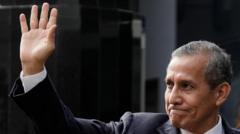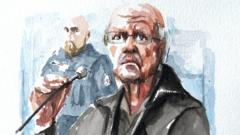Ollanta Humala, a former army officer and two-term president of Peru, has been sentenced to 15 years in prison following a conviction for money laundering, alongside his wife Nadine Heredia. The ruling comes after a lengthy trial that unveiled the couple's acceptance of illicit funds from Brazilian construction giant Odebrecht to support their election campaigns.
Ollanta Humala Convicted of Money Laundering: A Former President's Fall from Grace

Ollanta Humala Convicted of Money Laundering: A Former President's Fall from Grace
Ollanta Humala, ex-president of Peru, is sentenced to 15 years for money laundering linked to illegal campaign financing.
In recent proceedings, a court in Lima found Humala, who served as president from 2011 to 2016, guilty of accepting unlawful financial assistance from Odebrecht, which has been embroiled in numerous corruption scandals across Latin America. Prosecutors originally sought a harsher sentence, proposing 20 years for Humala and over 26 years for Heredia. The couple, who maintained their innocence throughout the trial, attended the verdict—Humala in person and Heredia via video link.
Humala's political career began in 2000 when he led a brief military insurrection against then-president Alberto Fujimori. His first presidential run in 2006 was marred by allegations of receiving funding from Venezuelan leader Hugo Chávez. However, during his successful 2011 campaign, he adopted a centralist approach and distanced himself from Chávez, garnering enough support to defeat Keiko Fujimori.
Despite initial success, Humala's presidency was plagued by violent unrest and declining popularity. His legal troubles began after leaving office in 2016, when Odebrecht's corruption schemes came to light, revealing extensive bribery to secure government contracts across the region. After a year in pre-trial detention, both Humala and Heredia were released, but investigations into their financial dealings continued, ultimately leading to their sentencing.
As Peru reflects on this high-profile case, it serves as a stark reminder of the persistent challenges of corruption within political systems, particularly in countries affected by major scandals. The repercussions of the ruling may have significant implications for Peru’s political landscape, which is continuing to grapple with integrity and governance issues.
As the aftermath unfolds, analysts will be closely monitoring reactions within Peru and beyond regarding the implications of this conviction for public trust and political accountability in the region.
Humala's political career began in 2000 when he led a brief military insurrection against then-president Alberto Fujimori. His first presidential run in 2006 was marred by allegations of receiving funding from Venezuelan leader Hugo Chávez. However, during his successful 2011 campaign, he adopted a centralist approach and distanced himself from Chávez, garnering enough support to defeat Keiko Fujimori.
Despite initial success, Humala's presidency was plagued by violent unrest and declining popularity. His legal troubles began after leaving office in 2016, when Odebrecht's corruption schemes came to light, revealing extensive bribery to secure government contracts across the region. After a year in pre-trial detention, both Humala and Heredia were released, but investigations into their financial dealings continued, ultimately leading to their sentencing.
As Peru reflects on this high-profile case, it serves as a stark reminder of the persistent challenges of corruption within political systems, particularly in countries affected by major scandals. The repercussions of the ruling may have significant implications for Peru’s political landscape, which is continuing to grapple with integrity and governance issues.
As the aftermath unfolds, analysts will be closely monitoring reactions within Peru and beyond regarding the implications of this conviction for public trust and political accountability in the region.



















